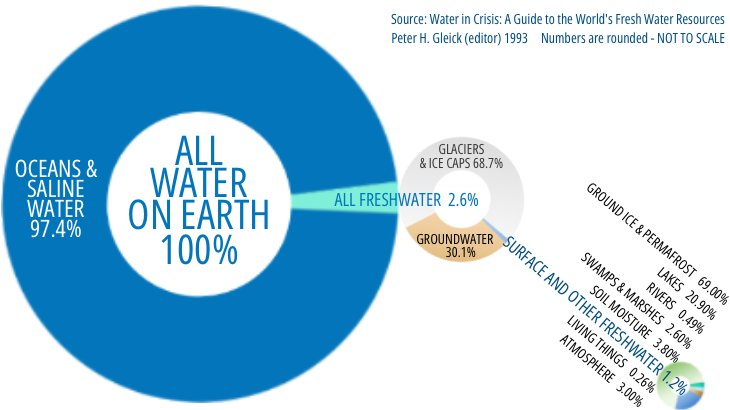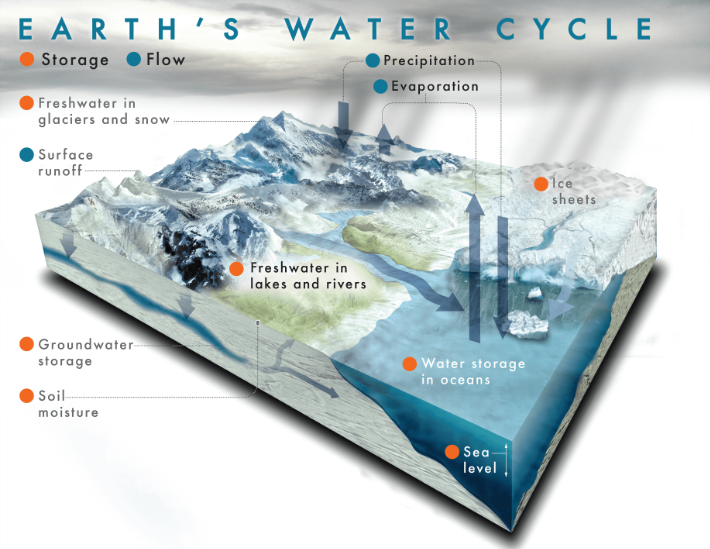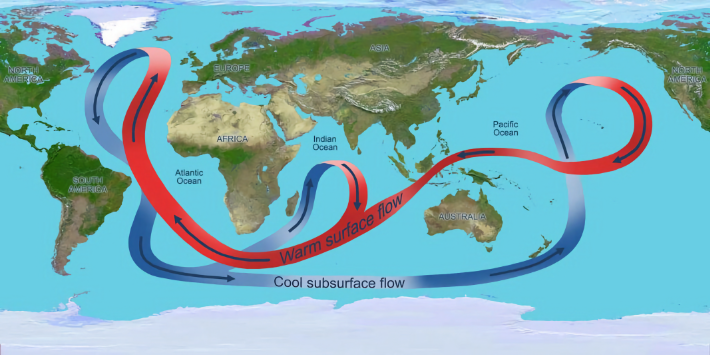GBGW 2023: There’s no more water

It’s true. All the water in the world is just that, all the water in the world. No one knows how water got here and we can't make more H2O. Welding two parts of hydrogen to one part oxygen doesn't work, unlikely as that seems in an age where hopes of solving worldly problems presume that ‘technology will fix it’.
Our undrinkable oceans and salty water add up to roughly 97% of all earth’s water leaving 2.6%, as freshwater, potentially useful to plants and animals, but over half of that is in groundwater or locked in glaciers and ice caps.
After accounting for groundwater, glaciers, and ice caps there’s just 1.2% of our freshwater left 97% of which is in frozen ground and permafrost, lakes, rivers, swamps and marshes, soil moisture, and in all living things. The remaining 3% of Earth’s freshwater is held in our atmosphere as water vapour - until it falls as mist, rain, sleet or snow, to sustain the world’s population.
There's a continuous process of water moving from Earth's surface into the atmosphere and back again: the water cycle.

In summary the stages of that hydrologic cycle are:
Evaporation: Heat from the sun causes water to evaporate from Earth’s surface, rivers, lakes, and oceans, turning it into water vapour that rises to the troposphere.
Condensation: Water vapour cools as it rises through the troposphere and condenses into clouds of tiny water droplets or ice crystals.
Precipitation: The condensed water falls back to earth when the clouds become too heavy.
Infiltration: Some of the precipitation seeps into the ground and becomes groundwater, some stored in underground aquifers.
Runoff: Some precipitation flows over the surface of the land and into rivers, lakes, and oceans, The cycle begins again.
Unfortunately for life on Earth, the very delicate balance of evaporation, condensation, precipitation, infiltration, and runoff that regulates earth's climate patterns and maintains ecosystems is becoming unstable.

Since the beginning of time ocean currents have distributed heat and energy around the Earth in a generally predictable pattern, moving warm water from the tropics towards the poles, where it cools and flows back to the tropics. The surface temperature of ocean currents and the heat of the sun influence the rate of evaporation, but surface water temperatures and solar energy inputs are changing and that is upsetting the historically stable hydrologic cycle.
The roughly two-thirds of freshwater locked in Arctic and Antarctic ice, and as icing on mountain tops, has been gradually unlocked by ever-so-slightly rising temperatures. The addition of this freshwater to saltwater is having complex and far-reaching effects on the ocean ecosystem, raising sea levels and creating havoc with weather systems.
Though this doesn’t generally affect us today, Britain is dependent upon currents that create the Gulf Stream, bringing the warmth that moderates our climate, keeping temperatures relatively mild, especially in winter, and contributing to our high levels of rainfall. Originating in the Gulf of Mexico, this warm, swift Atlantic current flows northwards along the eastern coast of the USA and then veers towards the British Isles and Europe. Without the Gulf Stream we would have a climate more like that found at similar latitudes in North America, with temperature and rainfall weather extremes we’ve never seen before. These certainly would affect us.
In our globalised world, where everything is interdependent, we need to think about tipping points, those critical thresholds where systems undergo irreversible change beyond which they cannot return to a previous state, even if the conditions that caused the change are reversed.
Think of events that mean home-made renewable energy becomes cheaper and no more unreliable than imported oil and gas. That’s a tipping point. Why would a country not develop its sources of renewable energy for its economy and security?
Think of events that reduce food availability and focus minds on food security such that improved farming methods deliver greater self-sufficiency. Why would a country not aim to feed itself?
Without wishing to overplay the role of CA-WN, think of that tipping point reached when a critical mass of residents determine to reduce their greenhouse gas emissions, improve local biodiversity, and work on building their community’s resilience to the effects of a changing climate. Wouldn't that be a great result for the Great Big Green Week 2023?

